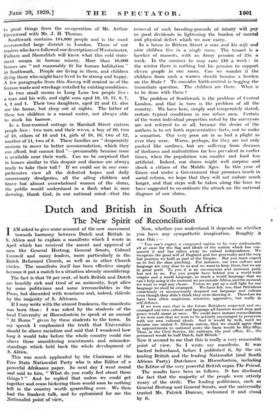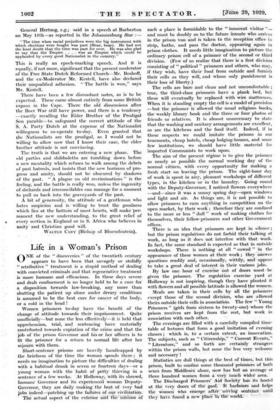Dutch and British in South Africa
The New Spirit of Reconciliation
T AM asked to give some account of the new movement -I- towards harmony between Dutch and British in S. Africa and to explain a manifesto which I wrote in April which has received the assent and approval of men like General Hertzog, General Smuts, Colonel Creswell and many leaders, more particularly in the Dutch Reformed Church, as well as in. other Church circles. The manifesto itself has been effective simply because it put a match to a situation already smouldering.
The fact is that 70 per cent. of both British and Dutch are heartily sick and tired of an animosity, kept alive by some politicians and some irreconcilables in the Press, but discarded with weariness and, indeed, ridicule by the majority of S. Africans.
If I may write with the utmost frankness, the manifesto was born thus : I was asked by the students of the local University at Bloemfontein to speak at an annual " At Home " given by these students to the town. In my speech I emphasized the truth that Universities should be above racialism and said that I wondered how long it would take before the whole country could rise above these smouldering resentments and misunder- standings which held back the whole development of S. Africa.
This was much applauded by the Chairman of the Free State Nationalist Party who is also Editor of a powerful Afrikaans paper. So next day I went round and said to him, " What do you really feel about these things ? " And he replied that unless we could get together and cease bickering there would soon be nothing left in the country worth quarrelling over. We then had the frankest talk, and he epitomized for me the Nationalist point of view, Now, whether you understand it depends on whether you have any sympathetic imagination. Roughly it was this :- " You can't -expect a conquered nation to be very enthusiastic all at once for the flag and ideals of the nation which has con- quered it and has taken away its valued independence. We recognize the good will of England and her generosity and the very fair position we hold as part of the Empire. But you must expect us to feel the shoe pinching. For instance, our own culture and language are very dear to us and we want to keep them, but we are in great peril. To you it is an unconscious and unmeant peril, but not to us. For you people have behind you a world -wide empire and a world language, so much a world language that we can't help using it the moment we areoutaide Africa, and the moment we want to read any classic. Unless we put up a stiff fight for our language we shall be swamped. We have felt, too, that Britishent consciously or unconsciously despised our language and culture even though they didn't think they were showing it. Therefore we have been often suspicious, sensitive, aggressive, but really in self-defence.
If we were sure that in the future Britishers respected and en- couraged our own culture and language all barriers would drop and peace would ensue at once. We could have instant reconciliation if we were sure that we were to be actively encouraged to persevere with our own cultural ideals. And it would be well, until we became one united S. African nation, that we should agree that in appointments to national posts the basis would be fifty-fifty. Thus, in the Civil Service, the railways, the post office, &c., the personnel would be half Dutch, half British."
Now it seemed to me that this is really a very reasonable point of view. So I wrote my manifesto. It was backed beforehand, before I published it, by the six leading British and the leading Nationalist (and South African Party) Dutchmen in Bloemfontein, including the Editor of the very powerful British organ The Friend.
The results have been as follows. It has disclosed the fact that the majority of the people were utterly weary of the strife. The leading politicians, such as General Hertzog and General Smuts, and the universally trusted Mr. Patrick Duncan, welcomed it and stand by it. General Hertzog, e.g.; said in a speech at Barberton on May ilth—as reported in the JohanneSburg Star
" The time when racial prejudices were the big instrument with which elections were fought was past (Hear; hear). He had not the least doubt that the time was past for ever. He was also glad to say that the Empire . . . . was an Empire which could be applauded by every good Nationalist in the country."
This is really an epoch-Marking speech. And it is equally, if not more, significant that the present moderator Of the Free State Dutch Reformed Church---Mr. Boshoff, and the 66:Moderator Mr. Kestell, have also declared their unqualified adhesion. " The battle is won," says Mr. Keitell.
There have been a few discordant notes, as is to be expected. These came almost entirely from some British Organs in the Cape. There the old dissensions after the Boer War still have power, and there is a tendency --Lexactly recalling the Elder Brother of the Prodigal Son parabletn safeguard the correct attitude of the S. A. Party 'Dutch at the expense of the Nationalist willingness to co-operate to-day. Even granted that the Nationalists are the prodigal, as I would not be Willing to allow now that I know their case, the elder brother attitude is not convincing.
The truth is that we are entering a new phase. The old parties and shibboleths are tumbling ' down before a new mentality which refuses to walk among the debris of past hatreds, and insists that the new horizons of pro- gress and amity, should not be obscured by shadovis of tbe past. " A plague On old recriminations " is the feeling, and' he battle is really won, unless the ingenuity Of diehards and irreconcilibles can manage for a moment to pull us back into the graveyards of the past.
A bit of generosity, the attitude of a gentlethan who hates suspicion and is - willing to trust the goodness which lies at the *ottani of most hearts, Will make 1.3er- manent the new understanding, to the great relief of • every section in England or in S. Africa who believes in unity' and Christian good will. WALTER CARY (Bishop of Bloemfontein).









































 Previous page
Previous page